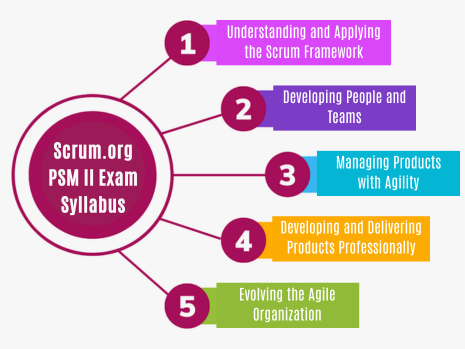Are you interested in taking your Scrum skills to the next level? Look no further than Scrum.org’s Professional Scrum Master II (PSM II) certification.
The Scrum.org Professional Scrum Master II certification is a highly esteemed credential in the Agile and Scrum community. In this article, we will provide you with all the information you need to prepare for the exam, and tips for preparing and becoming a certified Professional Scrum Master II.
What is a Professional Scrum Master II?
PSM II is the advanced level certification for Professional Scrum Masters who have mastered the basics of Scrum and have experience in applying it in the workplace. The certification is designed to demonstrate your ability to apply Scrum principles and practices in complex real-world situations.
What is the Format of the PSM II Exam?
The PSM II exam is a 90-minute, multiple-choice test that consists of 30 questions. The questions are designed to assess your ability to apply Scrum principles and practices in real-world situations. The passing score for the exam is 85%.
What Topics are Covered on the PSM II Exam?
The PSM II exam covers a variety of topics related to Scrum, including:
Skills and Knowledge Required
To pass the Scrum.org PSM II exam, you need to have a deep understanding of Scrum principles and practices, as well as the ability to apply them in complex and real-world situations. You should be familiar with the Scrum framework, including its roles, events, and artifacts, and be able to apply Scrum values to guide decision-making.
You should also be familiar with servant leadership, coaching, and facilitation, as these skills are essential for a successful Scrum Master. Additionally, you should have a good understanding of Agile and Lean principles and practices, and be able to identify areas of improvement in an organization’s Scrum implementation.
Benefits of the Scrum.org PSM II Certification
The Scrum.org PSM II certification is a valuable credential for Scrum Masters who want to demonstrate their expertise in Scrum principles and practices. It provides recognition for your knowledge and skills and demonstrates your commitment to continuous improvement.
PSM II certification holders have a deep understanding of Scrum and are able to apply it in complex and challenging situations. This knowledge and expertise can help you to advance your career and take on more challenging roles in Agile and Scrum organizations.
Is PSM II Difficult?
PSM II is not an easy certification to obtain. It requires a lot of dedication, hard work, and preparation. The PSM II certification exam is considered challenging, as it requires a deep understanding of the Scrum framework and its practical application. The exam format is designed to test a candidate’s ability to apply their knowledge in practical scenarios, making it more challenging than a theoretical exam. However, the difficulty level can vary based on a candidate’s experience and expertise in Scrum. It is recommended that candidates prepare thoroughly and have hands-on experience working with Scrum in complex situations to increase their chances of passing the exam.
Tips for Preparing for the Exam
Preparing for the Scrum.org PSM II exam requires dedication and focus. Here are some tips to help you prepare for the exam:
01. Review the Scrum Guide
The Scrum Guide is the definitive guide to Scrum and is the primary resource for the PSM II exam. Make sure to read it thoroughly and understand the principles and practices of Scrum.
02. Practice Scenarios
The PSM II exam is designed to test your ability to apply Scrum principles and practices in complex and challenging situations. To prepare for the exam, practice scenarios that require you to make decisions and apply Scrum in real-world situations.
03. Attend Scrum.org Training
Scrum.org offers a variety of training courses that can help you prepare for the PSM II exam. These courses provide in-depth knowledge of Scrum principles and practices and include hands-on exercises and real-world scenarios.
04. Join Scrum Community
Joining the Scrum community can be a valuable way to learn from other Scrum practitioners and stay up-to-date on the latest trends and practices in Agile and Scrum. Participate in online forums, attend meetups, and network with other Scrum professionals.
In addition to these resources, it is also recommended that you have real-world experience applying Scrum principles and practices. This will help you understand how Scrum works in practice and give you a better understanding of the topics covered on the exam.
How Do I Get PSM 2 Certification?
To get PSM II certification, you need to follow these steps:
- Gain experience as a Scrum Master: PSM II certification is designed for individuals who have gained practical experience as a Scrum Master. You need to have a good understanding of the Scrum framework, its principles, and practices to be eligible for the certification.
- Learn and study the Scrum framework: To pass the PSM II exam, you need to have a deep understanding of the Scrum framework and its practices. Scrum.org offers a variety of resources, including training courses, books, and articles that can help you learn and prepare for the exam.
- Practice with mock exams: Scrum.org offers free practice exams that can help you prepare for the actual exam. These exams are designed to simulate the actual exam experience and can help you identify your strengths and weaknesses.
- Register for the exam: Once you feel confident in your knowledge and skills, you can register for the PSM II exam on the Scrum.org website. The exam fee is $250 USD.
- Take the exam: On the day of the exam, make sure you are well-rested and prepared. You will have 90 minutes to answer 30 multiple-choice questions. If you pass the exam, you will receive the PSM II certification from Scrum.org.
Scrum.org Professional Scrum Master II is an advanced-level certification that requires a lot of hard work, dedication, and preparation.
Conclusion
The Scrum.org PSM II certification is a valuable credential for Scrum Masters who want to demonstrate their expertise in Scrum principles and practices. To pass the exam, you need to have a deep understanding of Scrum principles and practices, as well as the ability to apply them in complex and real-world situations. Preparing for the exam requires dedication and focus, but with the right approach and resources, you can succeed.








